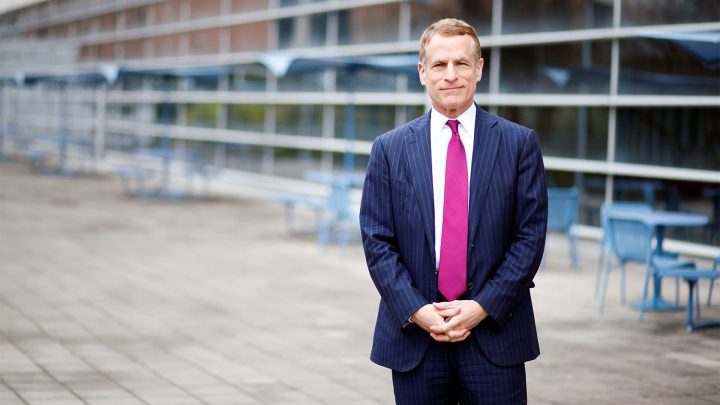
Dallas Fed president says closing racial disparities “very critical” for U.S. economy
Dallas Fed president says closing racial disparities “very critical” for U.S. economy

Even before the pandemic, communities of color — and Black communities, in particular — had the economic odds stacked against them when it came to securing a job, earning a living wage and building wealth. Many people of color were excluded from the country’s historic economic expansion, and subsequently had little cushion to fall back on during the COVID-19 crisis.
“Because of the pandemic, we’ve now taken a step backwards,” Robert Kaplan, the president and CEO of the Federal Reserve Bank of Dallas, told “Marketplace Morning Report” host David Brancaccio.
Kaplan said that removing the systemic barriers to financial success for Black and Hispanic communities is imperative as the U.S. economy recovers.
“If they don’t do well, if they don’t participate fully in this economy, we’re simply going to grow more slowly,” he said. “We’ll have slower workforce growth, and we’ll have slower productivity growth. So it’s very critical for all of us — for our future prosperity — that we find ways to have a more inclusive economy.”
Kaplan spoke to Brancaccio about what steps the country could take to achieve a more inclusive economy. The following are edited excerpts from the interview.
David Brancaccio: Put simply, systemic racism is everybody’s problem, as far as it affects the economy and beyond.
Robert Kaplan: Yes, it’s all of our problems. And the challenge is there are a number of things that we’re going to need to do to address it. I’ve spent a lot of time here at the Dallas Fed talking about, in particular, improving early childhood literacy, expanding pre-K, improving educational attainment, as well as beefed-up skills training. Those would be some examples of real changes that we’re making progress on, but we can do much better. I think that would help close this gap and would give us better GDP growth as a country.
Brancaccio: What’s your assessment of how we’re doing now here in mid-June, looking at the economy and its current state. Are we doomed?
Kaplan: We’re not doomed. We’re in the middle of a severe contraction, though, in the second quarter — we knew that was going to happen because of the virus and the lockdowns. It’s my own forecast that we’ll contract in the second quarter of this year on an annualized basis [by] about 35%. Some people think it’ll be a little higher. That’s the bad news.
Having said that, we think the economy probably bottomed out toward the end of April or early May; we think we are now growing. The most recent jobs report reinforces that. The most recent retail sales number suggests that. We’re going to grow for the remainder of this year. And you’re going to see positive job numbers in June, July, August. And we’re going to climb out of this this hole that we’ve that we’ve dug in the second quarter. The issue will be that how fast.
And I think a lot of how fast we grow from here is going to depend somewhat on monetary and fiscal policy. But I think it’s going to depend very heavily on how widely people wear masks, how widely we’re able to test, do contact tracing and manage the health care protocols as we reopen. And, so far, I think we’re doing that unevenly. I think people are wearing, for example, masks unevenly. If we did that in a more disciplined way, I believe we would grow faster, we’d have a better GDP growth for the year and we’d have a lower unemployment rate than we would otherwise. But I think the health care policies are at the forefront at this point.
Brancaccio: What about fiscal policy? What is the role of Congress?
Kaplan: There’s three parts to this. One is monetary, one is fiscal, and the third is the health care policies. There’s still going to need to be additional fiscal policy. In particular, there will have to be a decision made on continuing unemployment benefits. And I get that they’ll need to be restructured in order to create more incentives for people to be in the workforce, but I think those continuing probably is one element of fiscal policy.
The second issue that I see critically right now is the states and cities and municipalities in this country. They’re able to borrow, but because of what’s happened this quarter, they didn’t generate tax revenues. And most of them have a fiscal hole that they’re going to have to climb out of, because most of them need to have a balanced budget. They will need to cut their staffs and do budget cuts in order to address that — if they don’t receive grants from the federal government. And I think as we’re trying to grow jobs and climb out of this trough that we’re in, I think to the extent that state and local governments don’t have to do as significant of cutbacks, I think we’ll grow faster. So those are two elements for fiscal policy that I’d mention.
Click the audio player above to hear the full interview.
There’s a lot happening in the world. Through it all, Marketplace is here for you.
You rely on Marketplace to break down the world’s events and tell you how it affects you in a fact-based, approachable way. We rely on your financial support to keep making that possible.
Your donation today powers the independent journalism that you rely on. For just $5/month, you can help sustain Marketplace so we can keep reporting on the things that matter to you.
















